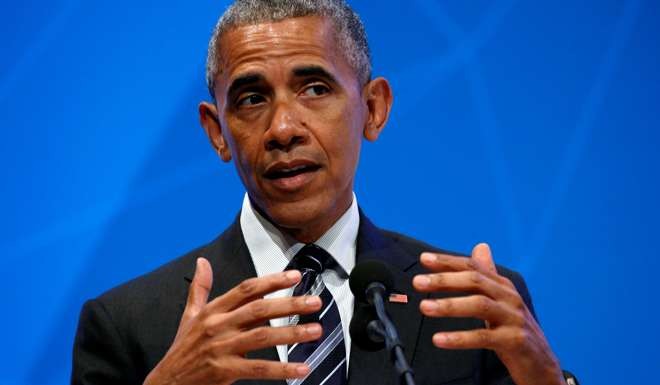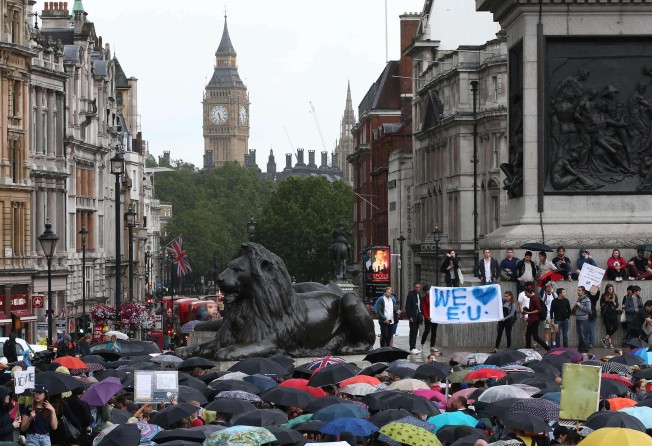
Obama says time to chill, hit the pause button over Brexit hysteria
Surging UK immigration drives Leave campaign

US President Barack Obama cautioned against “hysteria” over the United Kingdom’s vote to leave the European Union last week, saying all of Europe needs to take a breath and reassess how to preserve national identity while taking advantage of political and economic integration.
“I think that the best way to think about this is, a pause button has been pressed on the project of full European integration,” Obama told National Public Radio in an interview broadcast Tuesday. “I don’t anticipate that there’s going to be major cataclysmic changes as a result of this.”
Obama’s remarks on Brexit were his extensive since Britons voted last Thursday to leave the union of 28 countries that it joined in 1973. The resulting financial uncertainty shaved more than US$1 trillion out of stock markets and sent the British pound plummeting against the dollar.
But Obama noted that the the UK long ago opted out of the Euro, the common currency that forms the basis of the monetary union, and will remain a member of NATO. In that way, he said, the UK will become more like Norway — still very involved in Europe and the world, but not through the EU.
“I would not overstate it. There’s been a little bit of hysteria post-Brexit vote, as if somehow NATO’s gone, and the trans-Atlantic alliance is dissolving, and every country is rushing off to its own corner. And that’s not what’s happening,” Obama said. “What’s happening is you had a European project that was probably moving faster and without as much consensus as it should have.”

Obama said the European Union often seems “bureaucratic and deadlocked,” but that Europeans still share common core values.
“Europe can’t afford to turn inward,” he said, noting crises to the south in the north Africa and the Middle East and to the east in Ukraine.
Obama said the vote “speaks to the ongoing changes and challenges that are raised by globalisation.” But he rebuffed the notion that the result validates the campaign of presumptive Republican presidential nominee Donald Trump, whose campaign has had tones of economic and social isolationism.
“First of all, I think it’s important to remember that Mr. Trump embodies global elites and has taken full advantage of it his entire life, so he’s hardly a spokesperson — a legitimate spokesperson — for a populist surge of working-class people on either side of the Atlantic,” Obama said.
The United Kingdom’s vote to leave the European Union last week appears to have been driven in part by a historical surge of immigrants in recent years that has transformed the island nation.
Legal migration, particularly from Eastern Europe, has soared as new countries have entered the EU and their citizens — with the blessing of UK leaders — took advantage of the bloc’s freedom of labour laws to enter Britain.
Annual legal immigration into the UK is now 10 times what it was in 1993, and experts believe this cultural dynamic fed fears of globalisation and job losses which, in turn, drove last Thursday’s vote to exit the EU.
Opponents of a British exit — “Brexit” — from the 28-nation EU argue that these new residents often take more menial jobs rejected by the British-born.
“You have understandable concerns about the impact of immigration and the changing world we live in and what that means for pressure on services, schools and infrastructure,” said Peter Catterall, a professor of sociology at the University of Westminster. “But on the other hand, the UK needs immigration for an ageing work force in some areas and to produce a vibrant economy.”
The migration influx has been so dramatic in recent years that currently one in 20 people living in the UK — 3 million people — were citizens of another EU country just two years ago, according to the British Office of National Statistics.
“You have understandable concerns about the impact of immigration and the changing world we live in...but on the other hand, the UK needs immigration for an ageing work force in some areas and to produce a vibrant economy”
Before 2004, when the EU expanded to include 10 new member states such as Latvia, Poland and other eastern European nations, net EU immigration to the UK averaged around 10,000 per year, according to the national statistics office.
When that expansion occurred, the UK, Ireland and Sweden allowed EU nationals to immigrate immediately under the bloc’s freedom of labour laws. The move unleashed vast numbers relocating to Britain.
Last year, 270,000 citizens from EU countries immigrated to the UK, the statistics office estimates. About 85,000 Britons left the island for other EU countries. The net migration to the UK of 185,000 was a record, according to Full Fact, an independent fact-checking organization.
“We’re such a small land mass. We can’t assimilate people just pouring in with no limitation,” said UK native Patricia Kawaja, who watched the voting unfold from her current home in Miami, Florida, and was sympathetic to native voting concerns about immigration. “Brits weren’t flooding into Romania. It was always a one-way street to the strongest country.”
Romania, along with Poland, are the two EU countries reporting the largest increase in immigrants to the UK in recent years, according to Full Fact. About 136,000 Romanians have relocated to Britain from 2011 to 2015.
Boris Johnson, the former mayor of London and leave supporter who is now a potential candidate for prime minster, disputed that immigration was the driving factor in the referendum. He wrote in the Telegraph on Monday that, “after meeting thousands of people in the course of the campaign, I can tell you that the number one issue was control — a sense that British democracy was being undermined by the EU system, and we should restore to the people that vital power.”
But troubling signs of anti-immigrant fervour have surfaced since the referendum. By Monday, there were reports of vandalism at a Polish community centre and verbal threats and harassment of minorities. London Mayor Sadiq Khan asked city police to be on heightened alert to deal with an increase in hate crimes.